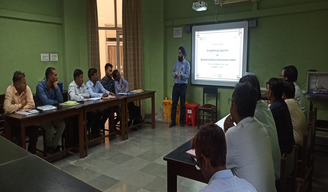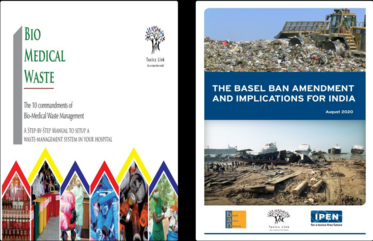UNSTARREDQUESTIONUSE OF TOXIC CHEMICALS IN VEGETABLES AND FRUITS
GOVERNMENT OF INDIA
MINISTRY OF HEALTH AND FAMILY WELFARE
LOK SABHA
UNSTARRED QUESTION
ANSWERED ON: 22/11/2019
Use of Toxic Chemicals in Vegetables and Fruits
Rameshbhai Lavjibhai Dhaduk
Will the Minister of HEALTH AND FAMILY WELFARE be pleased to state:-
(a) whether the Government is aware that toxic chemicals are being used for providing unnatural shine and ripening of vegetables and fruits in the country, putting the health of countrymen into severe jeopardy;
(b) if so, the details thereof; and
(c) the concrete steps being taken by the Food Safety Standard Authority of India collectively with the Ministry of Agriculture and State Governments to prevent this type of incidents, State/UT-wise?
ANSWER
THE MINISTER OF STATE IN THE MINISTRY OF HEALTH ANDFAMILY WELFARE
(SHRI ASHWINI KUMAR CHOUBEY)
(a) to (b): As per sub-regulation 2.3.6 of FSS (Contaminants, Toxins and Residues) Regulations, 2011, fresh fruits and vegetables shall be free from rotting and free from coating of waxes, mineral oil and colours. The regulations, however, allow that fresh fruits may be coated with bees wax (white and yellow) or carnauba wax or shellac wax at levels not exceeding Good Manufacturing Practices under proper label declaration as provided in Regulation 2.4.5 (44) of Food Safety and Standards (Packaging and Labelling) Regulations, 2011.
Under sub-regulation 2.3.5 of Food Safety and Standards (Prohibition and Restriction on Sales) Regulations, 2011, use of acetylene gas, commonly known as carbide gas, in artificial ripening of fruits has been prohibited. As an alternative, ripening of fruits by using ethylene gas at a concentration upto 100ppm (100µ/L) depending upon the crop, variety and maturity is permitted. Ethylene is a safer alternative. Ethylene is a hormone which is produced in the fruits naturally to facilitate their ripening in a natural way.
(c): Implementation and enforcement of Food Safety and Standards Act, 2006, Rules and Regulations made thereunder primarily lies with State/UT Governments. Food Safety Commissioners of States/UTs have been advised from time to time to keep a strict vigil by regularly drawing food samples from all sources and take strict action against offenders. Accordingly, in cases where samples are found to be non-conforming, penal action is taken against the defaulting Food Business Operators (FBOs) as per the provisions of FSS Act, 2006.
Further, a Guidance Note on artificial ripening of fruits has been published to create awareness among food business operators/ traders, consumers and other stakeholders related to various aspects of artificial ripening of fruits. It also includes Standard Operating Procedure detailing all facets of artificial ripening using ethylene gas and its reliable sources.






